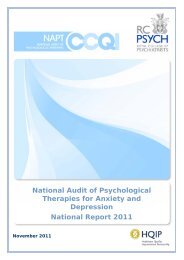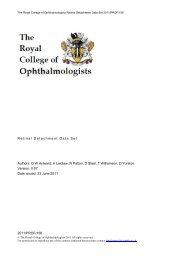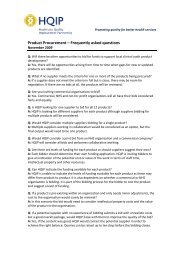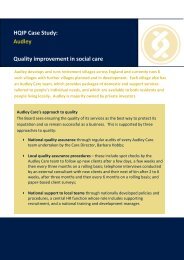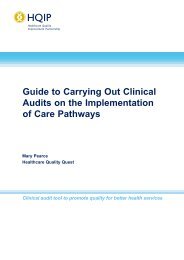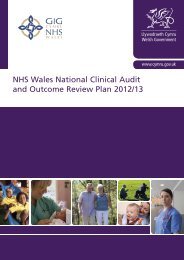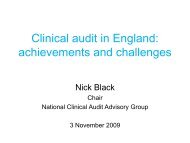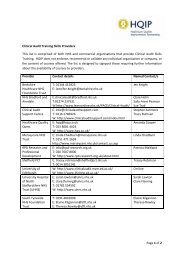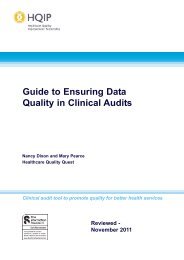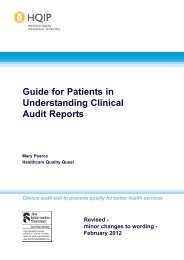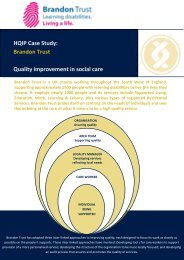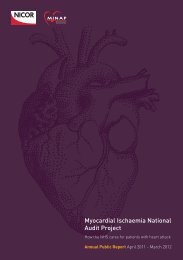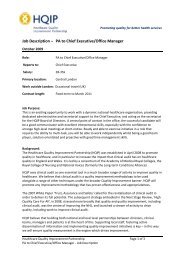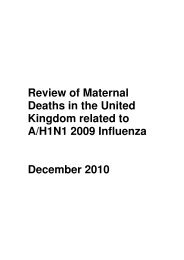Good Governance Handbook - HQIP
Good Governance Handbook - HQIP
Good Governance Handbook - HQIP
Create successful ePaper yourself
Turn your PDF publications into a flip-book with our unique Google optimized e-Paper software.
3. <strong>Good</strong> governance in today’s NHS<br />
3.1 The context for improved governance<br />
The Government is instituting significant system change in the NHS. Those on NHS<br />
boards, developing new organisations and overseeing service changes have all been<br />
keen to understand how this will affect the way NHS organisations will be governed in<br />
the future. The Secretary of State has said:<br />
“We will not fall into the trap of prescribing top-down processes or<br />
governance requirements to say how this should be achieved.” 3<br />
This makes it clear that accountability for public funds and service provision will rest<br />
with local healthcare organisations themselves. As the Health and Social Care Bill has<br />
been developed following ‘The 2011 Pause’ and the authorisation regime for Clinical<br />
Commissioning Groups (CCGs) has emerged, it is clear that the Government requires a<br />
high degree of accountability and maturity from those leading local NHS<br />
organisations. In 2012 the Department of Health intends to publish a guide for CCGs:<br />
‘Towards establishment: Creating responsive and accountable clinical commissioning<br />
groups’ which, in part, is aimed at helping these groups develop robust governance<br />
arrangements. The new CCGs and other healthcare providers will need to understand<br />
and apply the essential principles of good governance, and find a sensible,<br />
proportionate way of applying these locally. This challenge extends with new players<br />
entering the market in the form of Health and Wellbeing Boards (HWBs) and Clinical<br />
Senates, as well as the continuing challenge of developing accountability systems<br />
within a complex, inter-related care system where a patient’s journey is usually the<br />
joint endeavour of several organisations.<br />
NHS organisations have been extremely agile in the past at taking prescribed models<br />
of governance and finding ways of making them work locally. The challenge is now<br />
different. While there is a degree of central ‘scripting’ of local governance models,<br />
those developing CCGs or developing NHS Foundation Trusts (FTs) need to develop<br />
their own local model which will deliver high local accountability, help fuel innovation<br />
and the achievement of business goals and at the same time sensibly manage risk and<br />
deliver quality and safety. Additionally, as health care is, increasingly, planned and<br />
delivered across pathways of care, good governance within partnerships and across<br />
organisational boundaries becomes all the more critical (governance between<br />
organisations or GBO).<br />
<strong>Governance</strong> thinking is in part described in law, in part through academic enquiry and<br />
in part from various codes of better practice developed both within the UK and<br />
internationally. The NHS has developed its own codes and recommendations, these<br />
largely being drawn from commercial models. Those developing governance systems<br />
look to these sources, and benchmark better practice in comparable organisations.<br />
3 Liberating the NHS: Commissioning for Patients. A Consultation on Proposals Department of Health,<br />
22 July 010, Gateway ref 14483, p33<br />
www.good-governance.org.uk 5



